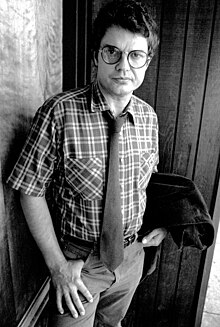Liberation Music Orchestra (Album)
| Liberation Music Orchestra | ||||
|---|---|---|---|---|
| Studio album by Charlie Haden | ||||
|
Publication |
||||
| Label (s) | Impulses! Records | |||
|
Format (s) |
CD, LP |
|||
|
Title (number) |
9 |
|||
|
running time |
51:16 |
|||
| occupation |
|
|||
|
Studio (s) |
Judson Hall ( New York City ) 27 - 29 April 1969 |
|||
|
||||
Liberation Music Orchestra is a 1969 published Jazz - album by Charlie Haden , taken on 27, 28 & 29 April 1969. It is the first album of his Liberation Music Orchestra . "The music on this record," wrote Haden in the liner notes, "is dedicated to creating a better world, a world without war and manslaughter, without poverty and exploitation."
Conception of the album
Charlie Haden explained his motivation for the album in an interview with Ashley Kahn : “I was really shocked by what was happening in Vietnam like I had not been for a long time. When we were planning the album, Nixon was bombing Cambodia . I called Carla Bley and said: I want to make a record of political songs! ”Musically, he was inspired by hearing songs from the Spanish Civil War . Four of these songs are included on the album: “Song of the United Front” (German: united front song ) by Hanns Eisler and Bertolt Brecht and the trilogy “El Quinto Regimento” (“The fifth regiment”), “Los Cuatro Generales” (“ The four generals ”) and“ Viva la Quince Brigada ”(“ Long live the Fifteenth Brigade ”), old Spanish folk songs that were given new lyrics during the civil war.
The album also includes Ornette Coleman 's War Orphans, which Haden played with Coleman in 1967, three pieces by Carla Bley , who also contributed many of the arrangements, and two pieces by Haden himself, one dedicated to Che Guevara and the other inspired by the Democratic National Convention of the Democratic Party of the USA in 1968, there opponents of the Vietnam War began to sing the song We Shall Overcome (the last track on the album) in protest . The orchestra tried to drown out the vocals with the songs You're a Grand Old Flag and Happy Days Are Here Again . Based on this incident, the musicians in the piece "Circus '68 '69" are therefore divided into two groups.
Ultimately, the range of means of expression used to implement the concept is large, "from Eisler's marching rhythm, to flamenco impressions, lyrical solo passages such as in the detailed bass intro from Song for Che to collective improvisations ."
effect
In 1970 Rolling Stone celebrated the record as an “extremely dense, moving, impressive and essential recording”. In 2005, the Jazz Times ranked the album among the most important albums of the last few decades. Also Ralf Dombrowski considers the album a "milestone in the history of jazz" and it turns out that the ensemble in his playing position "wild, engaging and reflects at the same time" worked, almost as "a logical continuation of the indifferent idea of freedom of jazz of the early sixties." The Music magazine Jazzwise added the album to The 100 Jazz Albums That Shook the World list ; Keith Shadwick wrote:
- “ The 1960s was the decade in which orthodoxy was reversed, with Charlie Haden's debut album at the end of the decade, this was one of the most explicit expressions of left-wing sentiments found in the entire jazz world. "
Rolling Stone magazine voted the album 26th in its 2013 list of The 100 Best Jazz Albums .
Track list
- The Introduction (Bley) -1:15
- Song of the United Front (Brecht – Eisler) -1: 52
- El Quinto Regimento (trad., Arr. Bley)
Los Cuatro Generales (trad., Arr. Bley)
Viva la Quince Brigada (trad., Text Bart Van Derschelling) –20: 58 - The Ending to the First Side (Bley) -2:07
- Song for Ché (Haden) -9: 29
- Was Orphans (Coleman) -6:42
- The Interlude (Drinking Music) (Bley) -1:24
- Circus '68 '69 (Haden) -6:10
- We Shall Overcome ( Horton - Hamilton - Caravan - Seeger ) -1: 19
literature
- Ralf Dombrowski : Basis-Diskothek Jazz (= Reclams Universal Library. No. 18372). Reclam, Stuttgart 2005, ISBN 3-15-018372-3 .
- Ashley Kahn: Impulses! The label that Coltrane created . Rogner and Bernhard Verlag, Berlin 2007. ISBN 3807710264
Remarks
- ↑ cit. according to R. Dombrowski Basis-Discographie Jazz , p. 97
- ↑ cit. after Kahn, p. 202 f.
- ↑ a b Dombrowski Basis-Diskographie Jazz , p. 97
- ^ An extremely tight, moving, impressive, substantial record. See review by Lester Bangs
- ↑ n. Charlie Haden The world has not gotten better The daily newspaper , November 3, 2005
- ↑ In the original: "The 1960s was a decade when that orthodoxy was reversed, with Charlie Haden's debut album at the decade's end being one of the most explicit endorsements of leftist sentiments to be found in the entire jazz world."
- ↑ The 100 Jazz Albums That Shook The World ( Memento of the original from July 11, 2012 in the Internet Archive ) Info: The archive link was inserted automatically and has not yet been checked. Please check the original and archive link according to the instructions and then remove this notice.
- ↑ Rolling Stone: The 100 Best Jazz Albums . Retrieved November 16, 2016.
